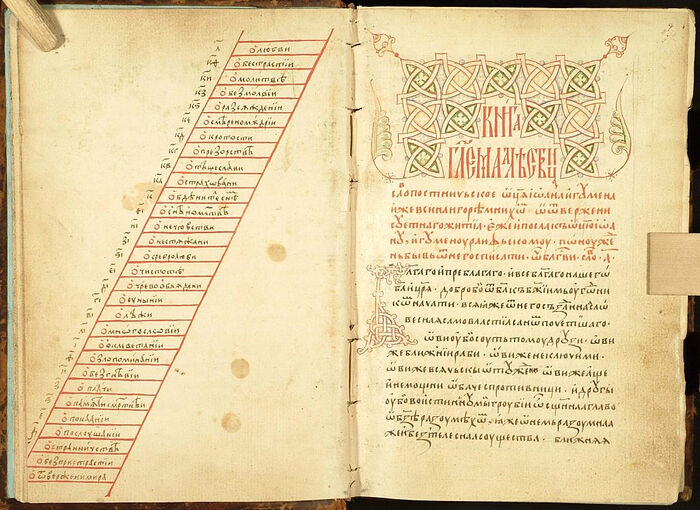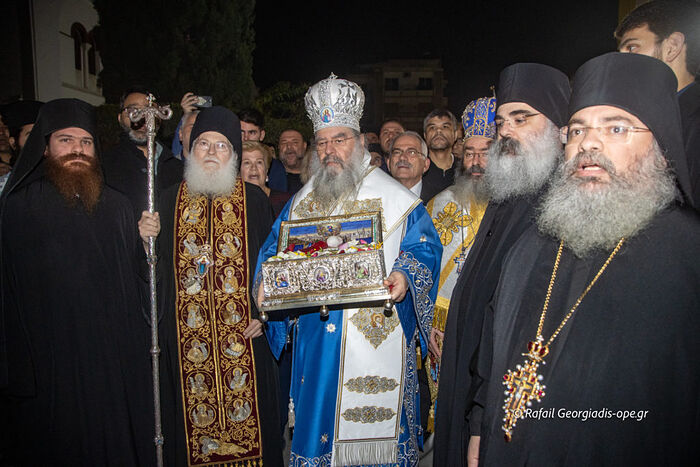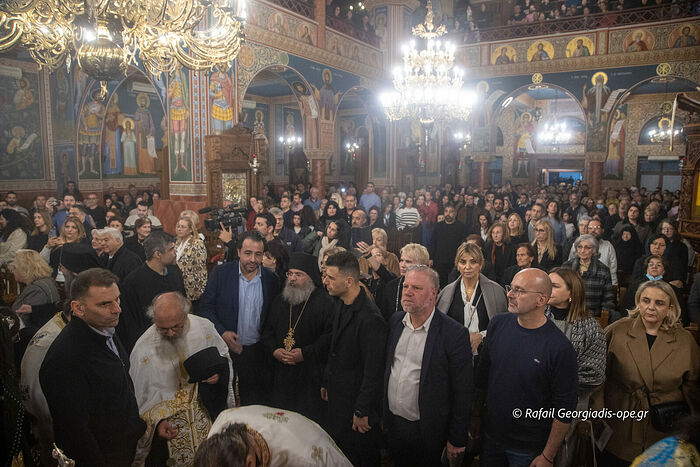The challenge of overcoming obstacles — whether they be cultural, spiritual, or even ecclesial — shaped much of the conversation at this year’s Los Angeles Religious Education Congress.
Held Feb. 16-18 at the Anaheim Convention Center, the event’s adult sessions drew some 12,000 adult participants and more than a hundred speakers from around the world. A day earlier, 6,500 local teens attended the Congress Youth Day, which featured a series of youth-themed workshops, prayer opportunities, and a magic show by speaker Giancarlo Bernini.
The theme of this year’s Congress was “Be Loved!” and at the opening ceremony Friday morning, its lead organizer invited participants to reflect on the things that get in the way of accepting God’s love.
“It is not enough to perceive God’s love only once,” said Sister Rosalia Meza, VDMF, director of the Archdiocese of Los Angeles’ Office of Religious Education. “The invitation and challenge are to choose this incredible truth of being a beloved child of God every day.”
In his welcome remarks, Archbishop José H. Gomez began by remembering late LA Auxiliary Bishop David O’Connell as a man who “loved Jesus Christ and was always a joyful presence” at past congresses. O’Connell was found murdered in his home days before last year’s congress.
“I still miss Bishop Dave every day,” said Archbishop Gomez. “I know he is looking down on us this weekend from heaven, and he is smiling on us all.”
A pilgrim entrepreneur speaks
Congress keynote speaker Jessica Sarowitz talked about the ways her recent pilgrimage on the Camino de Santiago in Spain gave her a new perspective on the power of spiritual mentorship in life.

Jessica Sarowitz, the founder of Miraflores Films and executive producer of the faith-centered “With This Light” documentary, was the keynote speaker on Saturday, Feb. 17 at the 2024 LA Religious Education Congress. (Archdiocese of Los Angeles)
Sarowitz, a business entrepreneur and self-described “social impact investor,” cited two mentors in her talk: Sister Maria Rosa Leggol, known as the “Mother Teresa of Honduras”; and someone she referred to as “Sister Joan,” whom she met during a Zoom book club during the pandemic.
Sarowitz, herself a native of Honduras, is the executive producer of “With This Light,” a 2023 documentary on Leggol. She first met the Franciscan sister at the age of 8.
“I knew she was extraordinary,” said Sarowitz. “And she gave great hugs.”
Getting to know Sister Joan over Zoom discussions about Laudato si’ , Pope Francis’ encyclical on care for the environment, helped inspire her to embark on a six-day, 100-plus kilometer Camino journey with her husband. Over the pilgrimage, she recalled, she came to realize her 40-pound backpack stuffed with so many things she thought she needed had become a metaphor for her life.
By the third day, she started to empty the backpack of things that weren’t necessary.
“It bore the weight of my anxiety, negativity, distrust, pain, grief, and past disappointments,” said Sarowitz. “The weight mirrored the heaviness in my spirit. I soon found solace in the support of my fellow travelers and in Scripture.”
The answer, suggested Sarowitz, is to form deeper relationships as God’s children.
“You have a loving, supportive community. Just look around this room at how glorious it is. Spiritual mentors are everywhere, ready to welcome and accept you. We know society thrives by service and deep connection. That is the core of trust and God’s love.”
A synodal intermission
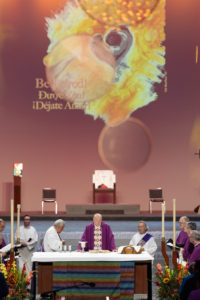
Cardinal Robert W. McElroy of the Diocese of San Diego celebrates Eucharist during the 2024 LA Religious Education Congress. McElroy also gave a talk about the Synod of Bishops on Synodality. (Archdiocese of Los Angeles)
Beyond the congress’ spiritual message, perhaps the most prominent theme reflected in the event’s most well-attended talks was the ongoing Synod of Bishops on Synodality, set to conclude next fall with a second monthlong gathering made up of bishops, men and women religious, and lay delegates.
In a talk titled “Our Synodal Journey,” synod delegate Cardinal Robert W. McElroy of San Diego began by praising the LA congress as “one of the great synodal gatherings that take place in this nation every year.”
McElroy’s presentation offered a summary of the deliberations at last fall’s session in Rome, and a look at some of the synod’s “overarching questions” going forward, including decentralization of Church authority, inclusion, and the possible changes to Church teaching.
On decentralization, for example, McElroy said the Vatican’s recent decision to allow varying implementations of its recent document on blessings for people in irregular and same-sex unions was due to different “cultural and pastoral factors, as well as neocolonialism” in some countries.
But while it is “wholly legitimate” for a priest to decline performing the blessings outlined in Fiducia Supplicans (“Supplicating Trust”), Catholics have a “rigorous obligation” to accompany people who identify as LGBT, said McElroy.
The 70-year-old prelate blamed opposition to such blessings on “an enduring animus among far too many towards LGBT persons.”
McElroy also said there was consensus at the synod in calling for a “paradigm shift” in giving women more decision-making roles and responsibilities in the Church. In another talk on synodality later that afternoon, Sister Teresa Maya, CCVI, said she was surprised to hear similar proposals about women in the Church — including the possibility of ordained ministry — from the different reports that emerged during the synod.
“I never thought I would read [these statements] in my lifetime,” said Maya, a theologian and former head of the Leadership Conference of Women Religious (LCWR). “Something is shifting.”
Both talks were well attended, and congress-goers had different views on what such shifts should look like.
Eileen Givens of Orlando, Florida, is the director of the Missionaries of the Precious Blood’s “Companions” charism. She agreed with Maya’s assessment that women’s voices are “starting to be heard.”
“We have men in the leadership role of ordination, but the women are in the ministries, are leading them. There’s excitement and energy behind that.”
Stephanie Hardy, RCIA coordinator at Holy Apostles Church in Meridian, Idaho — the state’s largest Catholic parish — said she’d like to see women be equal in the Church, “not do men’s jobs.”
“There’s some things we’re not called to do … and that’s OK,” said Hardy. “Too many times, women think we need to be men in order to be acknowledged, to be special, to bring people to the Church. But frankly, I can do more as a woman than I could as a man because that’s my gift.”
Where is the faith?
Catholic educators in Anaheim for the weekend said they came to the congress looking for resources for an increasingly complicated mission.
First-time congress attendee Nati Castillo, a catechist at Our Lady of Grace in Encino, said that being at the congress helped her with her faith simply by being “with other similar people that are trying to do the same.”
In answering the call to be a catechist, Castillo said she “didn’t want somebody to think there is something missing in their lives because there’s no one to tell them about Our Lord.”
“In our culture, things are changing a lot to very anti-God in our public schools,” where most of the children in the parish are educated, said Castillo.
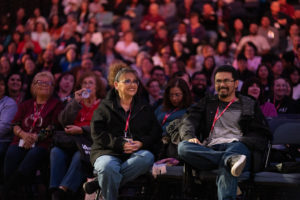
Participants at the 2024 LA Religious Education Congress smile during one of the workshops. The theme for the 2024 event was “Be Loved.” (Archdiocese of Los Angeles)
Michelle White came to the congress with a cohort of educators all the way from the Archdiocese of Brisbane in Australia, where she’s a Catholic school principal in the town of Maryborough.
On Friday, she tuned into Sr. Patricia McCormack’s workshop titled “Engage, Evangelize, and Empower Parking Lot Parents.” The topic hit home for White, whose parish’s Catholic population is aging and in decline — with virtually no children being raised to replace them.
“It’s very sad, and we are trying to do so many things and just feel like we’re hitting our heads against the wall,” said White. “So I’m just hoping, if anything, to come away with my own faith life fulfilled, just to continue on.”
Albert Landa, a teacher at Paraclete High School in Lancaster, has been coming to the congress for the last 30 years. Every year, he said, there’s at least one “really good inspirational moment or talk that really hits me where I need it most.”
Asked about the most pressing challenges his students face today, Landa said the perils of the “electronic age” topped the list.
“They’re so leashed and tethered to their phones and electronics that they can’t listen to God or anyone else,” said Landa, who comes to the congress every year with his wife, a teacher at St. Mary’s School in Palmdale.
Landa also sees a problem in youth whose “parents don’t take them to church and aren’t bringing them up in the faith.”
“They’re Catholic but they don’t know what that means anymore,” he said.
Later, on Sunday, a joint workshop hosted by a bishop and a layman unpacked a national framework for young adult ministry intended to bridge that gap: “Listen, Teach, Send,” modeled after Jesus’ approach on the road to Emmaus as a way of reaching young people.
“Ministry with young people does not start with just ‘I’m going to tell you something’ but begins in a posture of listening, just as Jesus began,” said Paul Jarzembowski, the U.S. Conference of Catholic Bishops’ associate director for the laity, who presented alongside Auxiliary Bishop José Arturo Cepeda of Detroit, chair of the bishop’s cultural diversity committee.
While listening is about trying to understand and empathize with what young people’s experience, “teaching” involves showing them what faith and the word of God might mean for their lives, Jarzembowski explained.
To “send” means giving young people “the tools now to share their faith with others, be champions for the marginalized, and to empower them so that they can make an impact on the Church now, not sometime in the future.”
A celebration of a ‘noble vocation’
At the welcoming ceremony on Friday, Meza had invited participants to write messages of how they know God’s love and to pin them on panels in the convention center lobby. By the end of the weekend, the notes overflowed as a mosaic. Teresa Cordeiro, a parishioner at St. Monica Church in Santa Monica, was one of the first to pin her paper message to the panel.
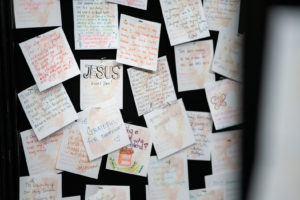
Attendees of the 2024 LA Religious Education Congress were asked to write messages about how they feel loved by God. (Archdiocese of Los Angeles)
“I wanted as many people as will read it to know that God loves each of us,” Cordeiro said. “There’s nothing to be afraid of. When I look back, I see his hand throughout my life. He’s taken care of me.”
In his homily at the closing Mass, Archbishop Gomez reflected on God’s love in the context of the Sunday’s Mass readings, which spoke of Christ’s call to repent and believe in the Gospel.
“Jesus loves us for who we are, and he meets us where he finds us. But he never leaves us there, never leaves us in our sin.”
Quoting Pope Francis’ Lenten message this year describing Lent as “a season of conversion, a time of freedom,” Archbishop Gomez urged congress-goers to ask God “for the courage to continue our conversion to him, to continue our walk with him, and to deepen our conformity to his life.”
And, he added, “let us renew our commitment to the noble vocation of being catechists and teachers in the Church. Let us ask for new creativity and courage in our service of the Church’s mission of bringing our world to Jesus.”
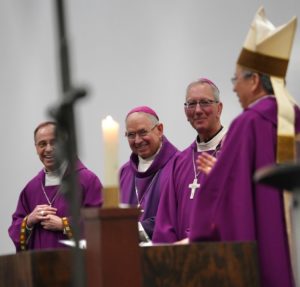
Bishop Joseph Nguyen Nang, right, the archbishop of Ho Chi Minh City, provokes a laugh from his fellow bishops during his talk on Friday, Feb. 16 at the 2024 LA Religious Education Congress. (Archdiocese of Los Angeles)
Tom Hoffarth also contributed to this report.
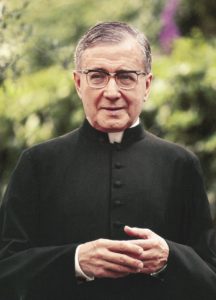
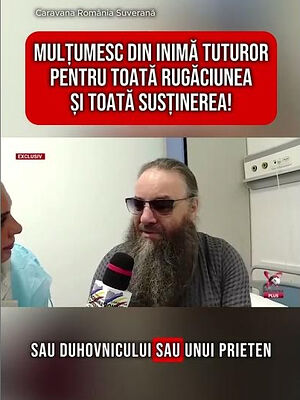
 Ukraine going after Metropolitan Longin, Hero of Ukraine, father of 100s of orphans (+VIDEO)Ukraine’s latest hierarchical target is one of the most beloved and authoritative bishops of the canonical Ukrainian Orthodox Church.
Ukraine going after Metropolitan Longin, Hero of Ukraine, father of 100s of orphans (+VIDEO)Ukraine’s latest hierarchical target is one of the most beloved and authoritative bishops of the canonical Ukrainian Orthodox Church.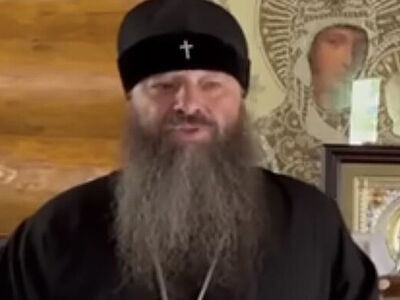 “It’s a great joy when you taste these bitter trials”—UOC hierarch announces state is taking him to courtHis Eminence Metropolitan Longin of Bancheny of the canonical Ukrainian Orthodox Church, a beloved hierarch and father to 100s of orphans, announced on Tuesday that the state’s investigation against him has finished, and the matter will now go to court.”>accused of “inciting religious enmity”—the same phony charge being brought against a number of Orthodox hierarchs.
“It’s a great joy when you taste these bitter trials”—UOC hierarch announces state is taking him to courtHis Eminence Metropolitan Longin of Bancheny of the canonical Ukrainian Orthodox Church, a beloved hierarch and father to 100s of orphans, announced on Tuesday that the state’s investigation against him has finished, and the matter will now go to court.”>accused of “inciting religious enmity”—the same phony charge being brought against a number of Orthodox hierarchs.  Ukrainian Metropolitan, father of 100s of orphans, victim of state oppression, suffers severe strokeOne of the most beloved hierarchs of the canonical Ukrainian Orthodox Church suffered a severe stroke and was hospitalized on Friday, July 21.
Ukrainian Metropolitan, father of 100s of orphans, victim of state oppression, suffers severe strokeOne of the most beloved hierarchs of the canonical Ukrainian Orthodox Church suffered a severe stroke and was hospitalized on Friday, July 21. Persecuted Metropolitan Longin again hospitalized with heart problemsArmed security forces surrounded and searched his monastery last month, scaring the orphans who live there.”>in December with atrial fibrillation, after which he
Persecuted Metropolitan Longin again hospitalized with heart problemsArmed security forces surrounded and searched his monastery last month, scaring the orphans who live there.”>in December with atrial fibrillation, after which he  Persecuted Metropolitan Longin undergoes heart surgeryThe Metropolitan has been in poor health in recent years, which is only exacerbated by the pressure of the Ukrainian state’s persecution against the Church and against him personally.”>underwent heart surgery. Later that month, the Metropolitan’s car was unjustifiably detained and searched. Following the incident, his condition worsened and he experienced a heart arrhythmia.
Persecuted Metropolitan Longin undergoes heart surgeryThe Metropolitan has been in poor health in recent years, which is only exacerbated by the pressure of the Ukrainian state’s persecution against the Church and against him personally.”>underwent heart surgery. Later that month, the Metropolitan’s car was unjustifiably detained and searched. Following the incident, his condition worsened and he experienced a heart arrhythmia.  Persecuted Metropolitan Longin attacked at home, has to undergo surgery”This happened on the night of January 22, 2024. Someone knocked on the door three times, and when I opened it, I was struck and knocked unconscious.”
Persecuted Metropolitan Longin attacked at home, has to undergo surgery”This happened on the night of January 22, 2024. Someone knocked on the door three times, and when I opened it, I was struck and knocked unconscious.”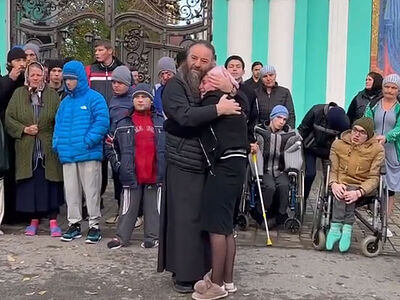 Armed security forces surround Ukrainian monastery that is home to hundreds of orphans (+VIDEO)The monastery is run by His Eminence Metropolitan Longin, one of the most authoritative hierarchs of the UOC, who is also the adopted father to hundreds of orphans who are cared for at the monastery.
Armed security forces surround Ukrainian monastery that is home to hundreds of orphans (+VIDEO)The monastery is run by His Eminence Metropolitan Longin, one of the most authoritative hierarchs of the UOC, who is also the adopted father to hundreds of orphans who are cared for at the monastery. House of persecuted Metropolitan Longin goes up in flames in western UkraineThankfully, the Metropolitan was not harmed, but the roof of the house was destroyed and the structure is no longer suitable for living in. Locals are certain it was a case of arson.”>In early January, his house in Bukovina went up in flames.
House of persecuted Metropolitan Longin goes up in flames in western UkraineThankfully, the Metropolitan was not harmed, but the roof of the house was destroyed and the structure is no longer suitable for living in. Locals are certain it was a case of arson.”>In early January, his house in Bukovina went up in flames. 




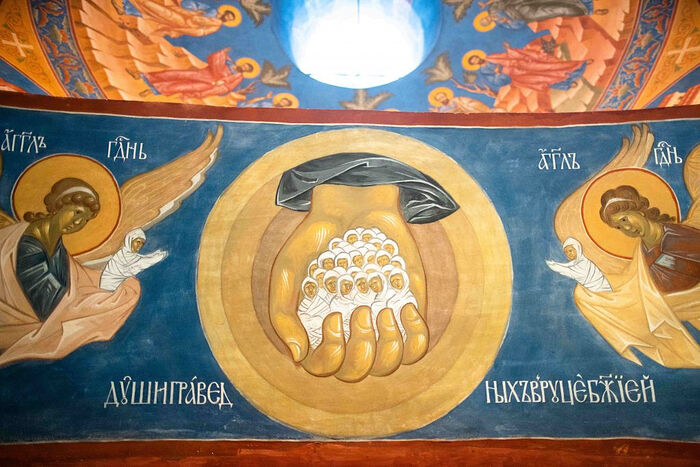
 About a Miracle of St. PaisiosThen one day I had a dream. I saw Elder Paisios coming towards my bed, and he took me by the hand and carried me somewhere.
About a Miracle of St. PaisiosThen one day I had a dream. I saw Elder Paisios coming towards my bed, and he took me by the hand and carried me somewhere.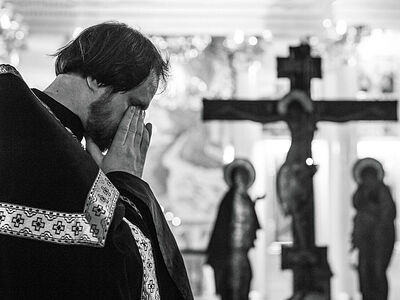 Moral Theology. Chapter 7: HumilityOur holy fathers-ascetics pointed to one way whereby the sincerity and depth of humility may be found out.
Moral Theology. Chapter 7: HumilityOur holy fathers-ascetics pointed to one way whereby the sincerity and depth of humility may be found out.